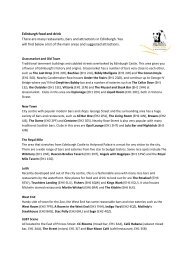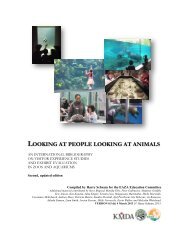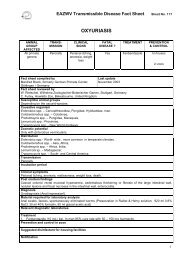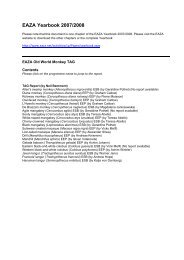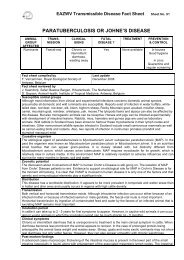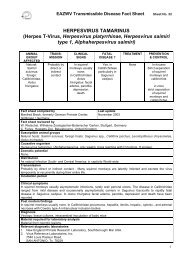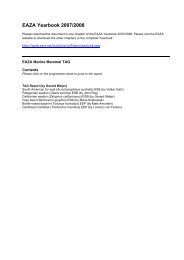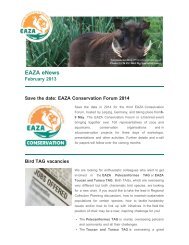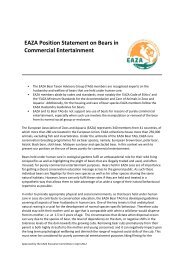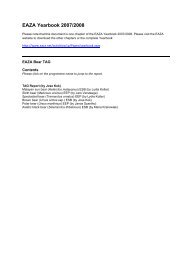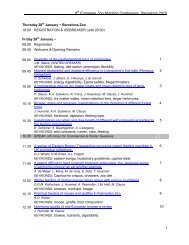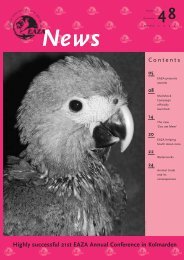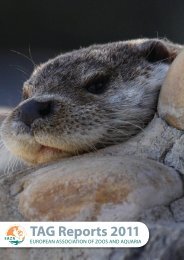EAZA News 58-9 - European Association of Zoos and Aquaria
EAZA News 58-9 - European Association of Zoos and Aquaria
EAZA News 58-9 - European Association of Zoos and Aquaria
Create successful ePaper yourself
Turn your PDF publications into a flip-book with our unique Google optimized e-Paper software.
Developing research<br />
potential<br />
The purpose <strong>of</strong> the <strong>EAZA</strong> Research<br />
Strategy is to help zoos <strong>and</strong><br />
aquaria to develop their research<br />
potential. It also aims to promote<br />
research partnerships between<br />
<strong>EAZA</strong> member institutions, <strong>and</strong><br />
between zoos <strong>and</strong> academic institutions<br />
<strong>and</strong> other research institutions.<br />
Biodiversity conservation<br />
<strong>and</strong> animal welfare are its main<br />
objectives. Scientific education<br />
<strong>and</strong> training, the publication <strong>and</strong><br />
dissemination <strong>of</strong> research results<br />
<strong>and</strong> new information, <strong>and</strong> the<br />
linking <strong>of</strong> in-zoo investigations to<br />
in situ studies are included in the<br />
research vision <strong>and</strong> mission. These<br />
are placed against an increasing<br />
awareness <strong>of</strong> the need to deal<br />
with emerging diseases <strong>and</strong> global<br />
climate change.<br />
The goals that <strong>EAZA</strong> wants to<br />
accomplish are outlined in the<br />
document together with a number<br />
<strong>of</strong> suggestions as to how they<br />
might be achieved. The <strong>EAZA</strong><br />
Research Committee has addressed<br />
questions such as prioritisation <strong>of</strong><br />
research, how to build research<br />
capacity within zoos <strong>of</strong> all sizes,<br />
how research can be funded, <strong>and</strong><br />
where the results <strong>of</strong> research can<br />
be published. The document also<br />
briefly considers ethical issues,<br />
gives examples <strong>of</strong> previous <strong>and</strong><br />
current research, <strong>and</strong> indicates where<br />
further information may be found.<br />
The <strong>EAZA</strong> Research Committee<br />
has developed a scientific ‘vision’<br />
<strong>and</strong> ‘mission’ to support the<br />
science <strong>and</strong> research which underpins<br />
many <strong>of</strong> <strong>EAZA</strong>’ s functions.<br />
Research vision<br />
“Every <strong>European</strong> zoo <strong>and</strong> aquarium<br />
will make a significant contribution<br />
to effective research, particularly<br />
in the areas <strong>of</strong> biodiversity conservation<br />
<strong>and</strong> animal welfare. They<br />
will also produce <strong>and</strong> use highquality<br />
science to increase knowledge<br />
which improves the quality<br />
<strong>of</strong> decision-making <strong>and</strong> management<br />
<strong>of</strong> collections <strong>and</strong> projects.<br />
Furthermore, they will engage in<br />
scientific education <strong>and</strong> training.”<br />
Research mission<br />
The committee will work towards<br />
the research vision <strong>and</strong> will act to<br />
support <strong>and</strong> encourage <strong>European</strong><br />
zoos <strong>and</strong> aquaria to adopt a scientific<br />
approach <strong>and</strong> participate in<br />
research. The committee will also<br />
support zoos <strong>and</strong> aquaria to<br />
develop a meaningful expenditure<br />
plan for research purposes <strong>and</strong> for<br />
providing the necessary facilities,<br />
tools <strong>and</strong> staff to conduct effective<br />
biological research. <strong>Zoos</strong> <strong>and</strong><br />
aquaria will be encouraged to<br />
produce <strong>and</strong> publish high-quality<br />
scientific research in increasingly<br />
greater measure. They will be<br />
encouraged to develop new scientific<br />
perspectives, linking basic<br />
<strong>and</strong> applied research in situ <strong>and</strong><br />
ex situ, <strong>and</strong> to use existing <strong>and</strong><br />
new methodologies, including<br />
cryobiology <strong>and</strong> biotechnology, to<br />
engage in collaborative partnerships<br />
with peer institutions <strong>and</strong><br />
kindred organisations.<br />
The <strong>EAZA</strong> Research Committee<br />
has prepared an outline set <strong>of</strong><br />
goals for <strong>EAZA</strong> member institutions,<br />
TAGs, committees <strong>and</strong><br />
working groups in response to<br />
the relevant sections <strong>of</strong> the World<br />
Zoo <strong>and</strong> Aquarium Conservation<br />
Strategy. Summarised, each <strong>EAZA</strong><br />
member institution will:<br />
- identify <strong>and</strong> pursue it’s own<br />
research policies <strong>and</strong> priorities;<br />
- participate in research;<br />
- develop infrastructure for<br />
research;<br />
- link research to the collection<br />
planning process;<br />
- disseminate research plans,<br />
news <strong>and</strong> results;<br />
- identify research in which it can<br />
cooperate collectively;<br />
- ensure that staff underst<strong>and</strong> the<br />
value <strong>of</strong> research in zoos;<br />
- integrate research as a component<br />
<strong>of</strong> management decisions;<br />
- maximise the use <strong>of</strong> ZIMS <strong>and</strong><br />
other databases as research tools;<br />
- measure <strong>and</strong> evaluate research<br />
process <strong>and</strong> output.<br />
research<br />
The <strong>EAZA</strong> Research Strategy:<br />
Developing the research potential <strong>of</strong> zoos <strong>and</strong> aquaria<br />
Alastair A. Macdonald, vice-chair <strong>of</strong> the <strong>EAZA</strong> Research Committee, Royal (Dick) School <strong>of</strong> Veterinary Studies, University <strong>of</strong> Edinburgh, United<br />
Kingdom <strong>and</strong> Andrea L. Fidgett, member <strong>of</strong> the <strong>EAZA</strong> Research Committee, North <strong>of</strong> Engl<strong>and</strong> Zoological Society, Chester, United Kingdom<br />
<strong>EAZA</strong> TAGs, Committees <strong>and</strong><br />
Working Groups will:<br />
- identify research questions<br />
specific to their taxa/expertise;<br />
- ensure that all members underst<strong>and</strong><br />
the value <strong>of</strong> <strong>and</strong> need for<br />
research on their taxa/expertise;<br />
- disseminate research plans,<br />
news <strong>and</strong> results;<br />
- measure, evaluate <strong>and</strong> recognise<br />
research progress <strong>and</strong> the<br />
resultant output.<br />
The survey <strong>of</strong> research conducted<br />
among <strong>EAZA</strong> members during<br />
2005 provided a lot <strong>of</strong> very helpful<br />
<strong>and</strong> encouraging data. Clearly,<br />
<strong>EAZA</strong> zoos <strong>and</strong> aquaria should<br />
resolve to prioritise research <strong>and</strong><br />
build capacity, communication<br />
networks <strong>and</strong> resources. There is,<br />
in particular, a need to include<br />
research in budgets <strong>and</strong> to<br />
organise funding partnerships.<br />
The <strong>EAZA</strong> Research Strategy has<br />
been designed to support <strong>and</strong><br />
promote these opportunities. •<br />
photo rob doolaard (izp)/rotterdam zoo<br />
As soon as the <strong>EAZA</strong> Research Strategy is published, the document<br />
will be distributed amongst the <strong>EAZA</strong> membership <strong>and</strong> will be made<br />
available through the <strong>EAZA</strong> website.<br />
eaza news <strong>58</strong><br />
2007<br />
11



